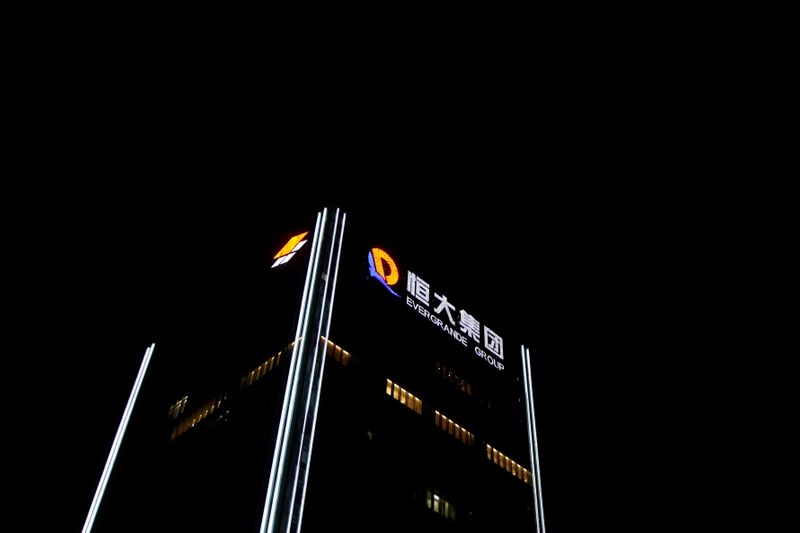SHANGHAI/LONDON (Reuters) – Chinese property firms’ bonds were hit with another wrecking ball on Monday as Evergrande looked set to miss its third round of bond payments in as many weeks and rivals Modern Land and Sinic became the latest scrambling to delay deadlines.
High-yield Chinese bond markets were routed once again as fears about fast-spreading contagion in the $5 trillion sector, which drives a sizable chunk of the Chinese economy, continued to savage sentiment.
Meanwhile, the Wall Street Journal reported that Chinese President Xi Jinping is launching inspections of financial institutions to see if private firms like Evergrande had been too close to state-owned banks, investment firms and financial regulators. Large lenders to Evergrande included financial conglomerate Citic, which is being scrutinized, the WSJ reported. Citic was not immediately available for comment.
Weary investors had been holding out little hope that Evergrande would suddenly stump up Monday’s near $150 million of coupon payments, but the fact bondholders said they hadn’t received anything this time either just bolstered expectations for a full-scale default.
“The key for offshore holders is the next couple of weeks and whether any payment or communication will come from the company in relation to its first missed offshore coupon,” wrote Craig Erlam, Senior Market Analyst, UK & EMEA, at forex trading firm OANDA https://www.oanda.com/us-en in a research note on Monday.
Erlam wrote that it was “highly unlikely” Evergrande would make the payment “considering how the last two deadlines have gone”.
A spokesperson for Evergrande did not immediately respond to a request for comment
Once China’s largest developer, the firm has more than $300 billion in liabilities that are now at risk.
The cash-strapped property developer’s troubles and contagion worries have sent shockwaves across global markets and the firm has already missed payments on dollar bonds, worth a combined $131 million, that were due on Sept. 23 and Sept. 29.
CST Group Limited, an investment holding company on Monday that it sold 10.5% China Evergrande Notes and 11.5% China Evergrande Notes for $815,000 and $702,000.
Other signs of stress included smaller developer Modern Land asking investors to push back by three months a $250 million bond payment due on Oct. 25 in part “to avoid any potential payment default.”
Sinic Holdings said it too was likely default next week as it didn’t have enough financial resources to make its remaining bond payments this year. It has one at the start of next week, although that bond was already down 75%.
Modern Land’s April 2023 bond with a coupon of 9.8% plunged more than 25% to 32.25 cents on the day, according to financial data provider Duration Finance, while the company’s shares have lost a third of their value over the last month.
Kaisa Group, which was the first Chinese property developer to default back in 2015, also saw some of its bonds slump to well under half their face value. R&F Properties and Greenland Holdings, which both have prestige projects in global cities like London, New York and Sydney, were also widely sold.
“It’s a disastrous day,” said Clarence Tam, fixed income portfolio manager at Avenue Asset Management in Hong Kong, highlighting how even some supposedly safer “investment grade” firms had now seen 20% wiped off their bonds.
“We think it’s driven by global fund outflow …. Fundamentally, we are worried the mortgage management onshore hits the developers’ cash flow hard,” he added, referring to concerns people could stop putting deposits down on new homes.
Analysts at JPMorgan also highlighted how international investors were now demanding the highest ever premium to buy or hold ‘junk’-rated Chinese debt.
There is now a whopping 1,200 basis point difference between the bank’s closely-followed JACI China high yield index and a similar index of investment grade AA-rated local Chinese market bonds, known as “onshore” bonds.
“Evergrande’s contagion risk is now spreading across other issuers and sectors,” JPMorgan’s analysts said.
Another London based analyst who asked not to be named said: “Slowly and gradually we are seeing the rest of the Chinese property sector fall apart”.
SHAKY FOUNDATIONS
In equity markets, the Hang Seng Property and Construction sub-index fell 0.4% against a nearly 2% rise in the broader index.
Fantasia Group China Co, whose controlling shareholder is Fantasia Holdings, said on Monday it would adjust the trading mechanism of its Shanghai-traded bonds following credit downgrades by China Chengxin International Credit Rating Co (CCXI).
Fantasia had appointed advisers on Friday after it shocked markets by missing a bond payment earlier in the week. It saw its bonds dive from almost 100 cents on the dollar to just 20 cents, as just a couple of weeks earlier it had said its liquidity was fine.
“We believe policymakers have zero tolerance for systemic risk to emerge and are aiming to maintain a stable property market, and policy support could be forthcoming if the deterioration in property activity levels worsen,” said Kenneth Ho, head of Asia Credit Strategy at Goldman Sachs.
“That said, we also believe that policymakers do not want to over-stimulate, and their longer term goal is to deleverage the property sector.”
Harbin, the capital of northeastern Heilongjiang province, has become one of the first cities in China to announce measures to support property developers and their projects, which have been shaken by the Evergrande crisis.
Advisers to offshore bondholders said on Friday they not yet heard from Evergrande, and are also demanding more information about its plan to divest some businesses, worried a potential fire-sale could ultimately leave them with less.
Trading in shares of Evergrande, as well as its Evergrande Property Services Group unit, has been halted since Oct. 4 pending a major deal announcement.
(Additional Reporting by Xiao Han and Clare Jim and Megan Davies and Niket Nishant; Editing by Mark Potter)
























